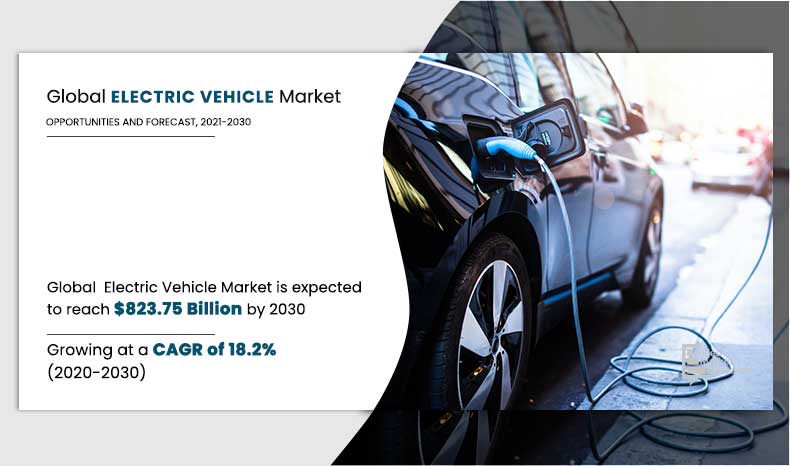According to the report published by Zion Market Research, global demand for electric vehicle market was valued at approximately USD 162.3 Billion in 2019, and is expected to generate revenue of around USD 656.2Billion by end of 2026, growing at a CAGR of around 22.4% between 2020 and 2026.
Global Electric Vehicle Market: Overview
An electric vehicle (EV) is a vehicle using one or more than one electric engines or propulsion motors. An electric motor can be powered via an electricity collector system from off-vehicle sources and can be autonomous to convert fuel into electricity using fuel cells, batteries, solar panels or electric generators. Such vehicles provide higher fuel efficiency, home charging conveniences, smoother driving, low carbon emissions & maintenance, and low motor sound. In addition, electric vehicles do not require changes to engine oil but are somewhat costly than their petrol equivalents.
Sample Request : https://www.zionmarketresearch.com/report/electric-vehicles-market
Global Electric Vehicle Market: Growth Factors
Growing demand for fuel-efficient, low-emission, and high-performance vehicles along with stringent government regulations towards vehicle emission such as ‘Zero Emission’ is fuelling the demand for electric vehicles all around the globe. Increasing investment in electric vehicles is considered a key market driver. Manufacturers such as Ford Motor Company, Daimler AG, and Groupe Renault are heavily investing in their project to produce EVs. For instance, in December 2018, Daimler AG invested USD 20.0 billion in the buying of electric vehicles battery cells. It focuses on the electrification of its Mercedes Benz portfolio with approximately 130 EVs by 2022. Again, another automotive manufacturer company such as Ford Motor Company is therefore planning to invest USD 11.0 billion in the production of 40 electric vehicles by 2022. The market is thus expected to increase over the forecast period.
Global Electric Vehicle Market: Segmentation
The global Electric Vehicle market is segmented based on various factors such as vehicle type, propulsion type, and vehicle class. Such as based on the vehicle type, it has been classified into passenger cars, two-wheelers, and commercial vehicles. The propulsion type is categorized into hybrid electric vehicles (HEV), battery electric vehicles (BEV), and fuel cell electric vehicle (FCEV). In terms of vehicle class, the market has been bifurcated into luxury, and mid-priced. The mid-priced vehicles class has limited features compared to luxury vehicles. China in APAC region is one of the leading mid-price countries. Companies such as BYD, Great Wall Motors produce relatively cheaper cars. For instance, in July 2018, Great Wall Motors entered into a partnership agreement with BMW Group to manufacture mini electric vehicles in China. Again, in the same year in the month of December, the company launched ‘ORA’ electric car brand: the ORA R1 that only costs USD 8,680, after incentives of nearly 200 miles.
Global Electric Vehicle Market: Regional Analysis
North America is dominating the global electric vehicle market. The region market share is mainly driven by United States, due to growing initiatives by government for building charging infrastructure throughout the country. Moreover, automotive manufacturers, charging network companies, non-profit organizations, and policymakers’ focuses on innovation, investments, and marketing which is aiding the market to grow rapidly. The market is expected to grow at a fastest CAGR rate in the Asia Pacific region. It is due to countries such as Japan, China, and South Korea, the automotive industry is inclined towards research & developments, technology and development of advanced electric vehicles. The growing demand to reduce CO2 emissions and to develop more sophisticated and fast charging stations is expected to boost the growth of electric vehicles. BYD Auto Co., Ltd, Chery Automobile Co., Ltd. and SAIC MOTOR are some of the major manufacturer of electric vehicle in Asia-Pacific region.
Global Electric Vehicle Market: Competitive Players
Some main participants of the Electric Vehicle market are Tesla Inc., Energica Motor Company S.p.A., Nissan Motor Corporation, BMW Group, Volkswagen AG, Daimler AG, General Motors, Toyota Motor Corporation, BYD Company Motors, Ford Motor Company, Groupe Renault, and Lucid Motors, Inc., Hyundai, and Honda among others.
Electric Vehicle Market: Regional Segment Analysis
- North America
- The U.S.
- Canada
- Europe
- France
- The UK
- Spain
- Germany
- Italy
- Rest of Europe
- Asia Pacific
- China
- Japan
- India
- South Korea
- Southeast Asia
- Rest of Asia Pacific
- Latin America
- Brazil
- Mexico
- Rest of Latin America
- Middle East & Africa
- GCC
- South Africa
- Rest of Middle East & Africa
FrequentlyAsked Questions
What are the key factors driving electric vehicle market expansion?
Growing demand for fuel-efficient, low-emission, and high-performance vehicles along with stringent government regulations towards vehicle emission such as ‘Zero Emission’ is fuelling the demand for electric vehicles all around the globe.
What will be the value of electric vehicle market during 2020- 2026?
According to Zion Market Research, global demand for Electric Vehicle market is expected to generate revenue of around USD 656.2 Billion by end of 2026, growing at a CAGR of around 22.4% between 2020 and 2026.
Which region will make notable contributions towards global electric vehicle market revenue?
North America is dominating the global electric vehicle market. The region market share is mainly driven by United States, due to growing initiatives by government for building charging infrastructure throughout the country. Moreover, automotive manufacturers, charging network companies, non-profit organizations, and policymakers’ focuses on innovation, investments, and marketing which is aiding the market to grow rapidly.
What are the key players leveraging electric vehicle market growth?
Some main participants of the global electric vehicle market are Tesla Inc., Energica Motor Company S.p.A., Nissan Motor Corporation, BMW Group, Volkswagen AG, Daimler AG, General Motors, Toyota Motor Corporation, BYD Company Motors, Ford Motor Company, Groupe Renault, and Lucid Motors, Inc., Hyundai, and Honda among others.



